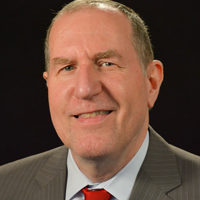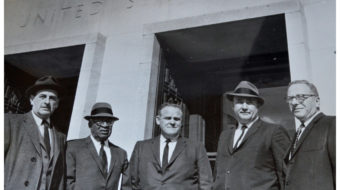
The capitalist class and the working class are in an economic struggle with each other daily. The capitalists want the workers to work harder for less pay so that they can make more profits; the workers want better working conditions and more money. They want a bigger, and better, share of the pie.
The capitalists figure out first that economic struggle is not enough. They figure out that a political struggle will be necessary, not just to help them in their daily economic struggles, but for the long term, to protect capitalism, the source of their profits.
When capitalism was in its revolutionary stage, those long ago days when it was struggling against the aristocracy and feudalism, the capitalists began to gradually realize that they would never win that struggle without changing the political system.
At first content to work within a monarchy, the capitalists came to the correct conclusion that feudalism had to be eradicated in order for their new system to be truly successful. Otherwise, where are you going to get all those workers to labor in your factories? In fact, the capitalists were the first to organize the workers: They needed the masses to overthrow feudalism and its aristocracy.
The capitalists learned early that political organization and political struggle were necessary to achieve the dominance of their class. It helps with the day-to-day issues, e.g., using lobbying to hold down the national minimum wage, and it helps to preserve their long-term interests.
So even though individual capitalists are in competition with one another, they realize that they have common political interests. The capitalists wage both an economic as well as a political struggle against the working class.
The workers, after first being organized to defend the capitalist class, soon learned that they, too, had to organize to protect their own interests. They formed unions which work on their day-to-day economic struggles. Unions help raise workers’ pay and better their economic conditions.
But, just like the capitalists, the workers have learned that defending their economic interests is not enough. The workers, too, need to wage a political struggle to achieve both their short-term economic goals as well as their long-term goals. They need a political party that will defend and assist them in their day-to-day struggles. And, they need a party that will lead them on the path to socialism, the long-term solution to their economic struggle.
Much of the organized U.S. working class has chosen, for now, to be allied with the Democratic Party. And this might be an apt choice, for now, in the face of a Republican Party that has increasingly come to openly represent fascism. But the Democratic Party is a party of the capitalists and, in the long term, will represent the interests of the capitalists. And even in the short term, the Democratic Party has provided only lukewarm support for working-class issues.
Socialism will not be possible without a political struggle and a political party that represents the working class. And while unions may be, ostensibly, non-political, their long-term interests can only be represented by a party that is striving for socialism, such as the Communist Party. The working class must begin to think about the long-term political struggle and which party really represents their interests.
As with all op-eds published by People’s World, this article reflects the opinions of its author.
We hope you appreciated this article. At People’s World, we believe news and information should be free and accessible to all, but we need your help. Our journalism is free of corporate influence and paywalls because we are totally reader-supported. Only you, our readers and supporters, make this possible. If you enjoy reading People’s World and the stories we bring you, please support our work by donating or becoming a monthly sustainer today. Thank you!










